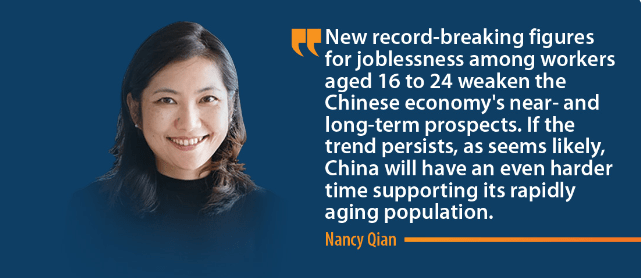China’s official figures issued this month indicate that the country’s young adult (16–24 year old) jobless rate hit a record high of 20.4% in April.
Even worse, the information was released only one month before an additional 11.6 million students would complete their studies at colleges and vocational schools and begin looking for employment.
It’s true that the lockdowns imposed by the government’s zero-COVID policy were considerably harsher and more costly to the economy than containment measures used by other nations, and they were often in place for longer than a year.
The fact that China’s economic recovery has behind others is thus not unexpected.
For contrast, the US youth unemployment rate peaked at 14.85% in 2020 before falling to 9.57% in 2021 and 6.5% in the present.
Although the majority of China’s pandemic-related job barriers have been removed, the basic circumstances for lowering China’s young unemployment are not getting any better.
Even though it will eventually be lower than it is today, the post-pandemic unemployment rate is still expected to be greater than it was in the years before to the pandemic.
Youth unemployment lowers lifetime wages, according to research, since it prevents young people from taking advantage of crucial chances to learn new skills.
There are several causes for this, but one major problem is the substantial difference between the “reservation wage” rate that recent graduates are prepared to take and the rate that employers are prepared to pay.
This discrepancy illustrates how much the cost of living has increased faster than wage growth.
A poll from 2021 found that positions for recent graduates earned an average of only CN5,290 ($749) per month in major cities like Shanghai and Beijing.
With some of the most expensive real estate in the world being found in Chinese cities, it is hardly enough to rent a 25 square meter (269 square foot) apartment.
These young people also understand that an occupation with such a low beginning pay is unlikely to provide the income growth required to sustain a family ten years from now.
A dual-career spouse with a kid must largely depend on a nanny since urban white-collar employees are often expected to work from 9 a.m. to 9 p.m. six days per week.
Nanny salaries in Shanghai and Beijing, however, are more than those of recent college graduates, despite the fact that they are mostly from the rural and frequently lack a high school diploma.
Why fresh grads don’t just relocate to smaller locations with cheaper cost of living is a question that has been raised.
That is what many younger American workers have done, moving to the Sunbelt or the Rustbelt from the San Francisco Bay Area or New York City.
However, the same relocation for Chinese employees would be far more expensive due to the fact that amenities in smaller cities are often considerably lower than in big cities (as is the case in the majority of middle-income nations).
Many third-tier cities still struggle to offer dependable energy and basic sanitation (such private indoor toilets), even if certain areas of China’s first-tier cities seem more rich than even New York or Tokyo.
It is understandable why the majority of college graduates stay away from these more “affordable” regions.
They instead depend on their parents to help pay for necessities. A nationwide study conducted in 2014 revealed that 30% of Chinese college graduates still lived with their parents.
However, in terms of young unemployment, parental assistance has a double-edged blade.
While some young employees rely on their parents for financial assistance, others decide not to work since their parents can afford to provide for them.
Due to the widespread transfer of property rights from the state to citizens during the housing reforms of the 1990s, young Chinese people who were born in metropolitan regions often have parents or grandparents who own flats in the city center.
Additionally, because of the one-child policy, which was in place from 1978 to 2016, these young individuals lack siblings and are thus eligible to inherit great real estate.
Why bother working for a pittance if you are in this circumstance and your parents can pay your living expenses?
Therefore, China needs more high-paying occupations in addition to more jobs overall. Any economy would find it challenging, but China would also have new challenges.
For the economy of China to support an aging population that is expanding quickly, fresh cohorts of highly productive employees are desperately needed.
For instance, young unemployment often contributes to other issues like rising crime and social and political unrest.
Youth unemployment lowers lifetime wages, according to research, since it prevents young people from taking advantage of crucial chances to learn new skills.
One year of unemployment at the age of 22 in the United Kingdom has been found to lower salaries by 13-21% 20 years later.
Anywhere, persistent, widespread youth unemployment may have seriously detrimental long-term macroeconomic effects.
But given that its population is aging at one of the quickest and greatest rates in the world, China is particularly affected.
For the economy of China to support an aging population that is expanding quickly, fresh cohorts of highly productive employees are desperately needed.
Chinese officials must prioritize economic development more than ever.

Leave a Reply